I finished my rewatch-and-review of Gravity Falls a few weeks ago, a project over a year in the making. To my shock and delight, the show’s creator Alex Hirsch himself reached out with compliments, and even offered to give an interview! The results are here before you.
Read on to hear about Gravity Falls merch, post-canon Pacifica, and a statement on what exactly happened with the censorship of “The Love God.”
Spoiler warning for Gravity Falls, as well as supplemental material.
[This interview has been edited for clarity and grammar. Otherwise, I’ve attempted to keep the conversation as intact as possible.]
Vrai Kaiser (TMS): It’s been over a year now since the finale aired (and even longer since production wrapped). Has the time working on other projects given you a different perspective on the series? Has being involved with things like Journal 3 and other licensed products (the games, the Choose Your Own Adventure Novel) on a slightly more detached level been a challenge?
Alex Hirsch: My main goal after Gravity Falls was finished was to take a vacation—a BIG one—and I spent about a year doing everything I couldn’t do while I was serving solitary confinement at Disney. I visited Hawaii, Japan, Portland, Burning Man. I did conventions in New York, Russia, Rio. My goal was to say “yes” to anything that wasn’t work. Sort of like Grunkle Stan on his worldwide boat tour with Ford, I needed some time away from the shack. But GF is a weirdness magnet after all and I can’t resist its pull forever. When Disney asked if I’d want to do Journal #3 I said yes immediately. It’s the number one thing I’d want to read if I was a fan, so I couldn’t pass up the opportunity.
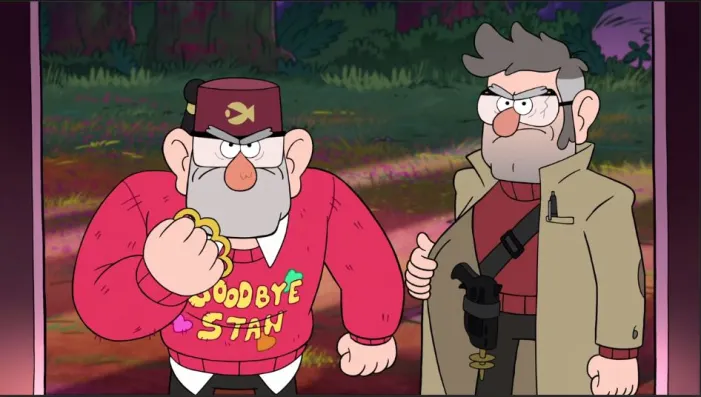
Kaiser: Was the Journal done in stages? i.e. was the original draft for the black light version, or did you have to come back and do that once the sales proved viable?
Hirsch: Definitely stages—the very first thing I asked when they brought up the possibility of doing a journal was whether we could include the black light messages, but we were told that it would be way too expensive and to just try to forget about it. Then when the book came out and was topping the NYT bestseller list, Disney Publishing agreed to release a special edition for the superfans and give me my dream of black lights.
The challenge then was to try to fit the new messages over the old pages as though they always belonged. But these are fun challenges. Probably the hardest part was on the “Floating Eyeballs” page—there’s a spot where you see text coming from under a Polaroid. But in the Special Edition Journal, the polaroid is finally removable, so I needed to think of sentences that would credibly end with the words you’ve already seen
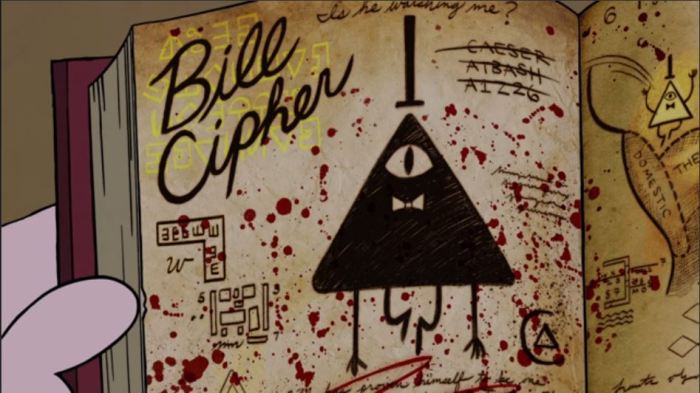
Kaiser: On that subject, Disney never seemed particularly keen on releasing much GF merch. Has the success of Journal 3 re-opened the conversation on things like the BluRay set?
Hirsch: The day that Disney bought Star Wars (AFTER buying Marvel) was the day I knew my merch dreams for Gravity Falls were basically toast. The company is too huge and we’re barely a blip on the radar to their consumer products division. Luckily the enduring popularity of the show has resulted in a few departments within the company sticking their neck out and trying cool experiments like journal 3. Everyone was surprised by the success of the journal except the fans. Their appetite for more continues to impress even this long after the end of the show. I’m hoping those numbers increase our likelihood of getting a DVD but I can’t make any promises.
Kaiser: Were you involved in getting The Mystery of Gravity Falls (@TheMysteryofGF) permission to do what is (according to them) small batches of sanctioned merch like the stone Bill figure and Grunkle Stan bobbleheads?
Hirsch: That guy is like my guardian angel. He’s some kind of brilliant, crazed super-fan who understands the show better than Disney ever did. Honestly, I don’t know how he contacted Disney and got the sanctioned merch—he’s some kind of wizard. I hope he runs the company one day.
[Note: I reached out to @TheMysteryofGF to check on this. Turns out I was slightly incorrect in my question. They have worked in conjunction with Disney on at least one occasion, but for the most part the merchandise they’ve made available has been of their own initiative, sometimes with help from an outside contractor. They also work with Bioworld, who provides the GF license to Hot Topic, in creating certain items.]
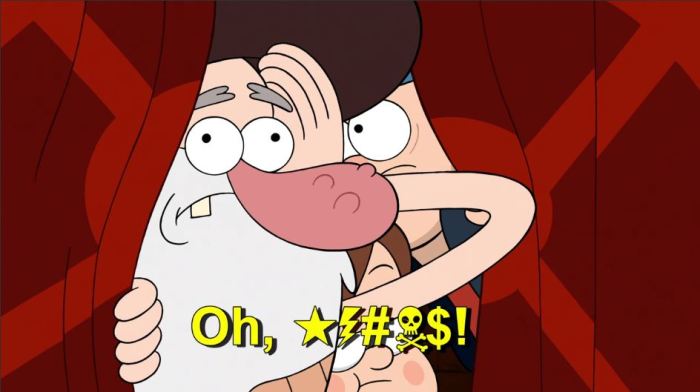
Kaiser: How did you approach fan interaction during the series? The codes are obviously built into the show from the get-go, but did you think it would catch on like it did? Did the response require you to adjust planned fan engagement on the fly?
Hirsch: The scope, size, influence and presence of fandom culture has gone through a complete and total revolution between now and when I first pitched Gravity Falls in 2011. Keep in mind- my first job was on Flapjack back in 2008-ish. Back then, you would release a cartoon into the ether, and it would basically disappear into a black void after airing. There’d be maybe two drawings on DeviantArt, maybe a message board with a few comments, and that was it.
That was the entirety of online feedback between cartoons and creators at the time. (And even those paltry scraps of feedback were still huge compared to fandoms when I was growing up. There was nobody in 1991 willing to die to make sure that their ship of Tommy Pickles and Reptar came to fruition. At least no one with a way of getting that opinion in front of Klasky-Csupo)
Tumblr’s rise happened just around the same time as Gravity Falls‘s premiere in 2012, so I was totally unprepared for the level of passion and engagement and fan art that would happen. I had to evolve along with all this in real time as it happened.
Kaiser: I always found it curious that you’d hold Twitter Q&As, but then delete the answers within a day.
Hirsch: Probably the best formats for answering questions were Reddit AMAs—I enjoyed doing two of those—and interviews. I occasionally answer questions on twitter when the mood strikes me, but Twitter is a TERRIBLE place for meaningful discourse.
Twitter has an ephemeral conversational glibness built into its core, but it ironically also has this incentive to cast every word said in bronze and isolate it from its context. It’s like if everything you said at a dinner party with every guest was carved into the wall and permanently became part of the house decorations. I’ll frequently prune my twitter posts to keep my feed clean from the residue of 100 little back and forths. Even if I tried to leave everything up, it disappears into the feed anyway. No matter how many times I say “There is no Season 3” people will never stop asking.
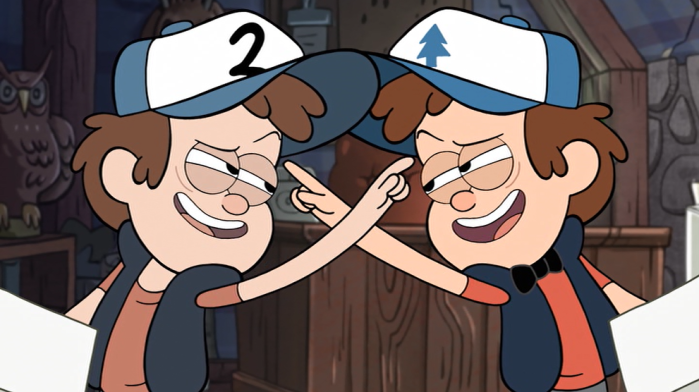
Kaiser: Obviously, that’s got to be a trial and error process. Any regrets?
Hirsch: I honestly don’t have many regrets from my engagement with fans, because everything that happens, positive and negative, is a learning experience and teaches me something about our world and the culture we live in. And overwhelmingly it has been positive. Back in the pre-fandom-culture days I never could have imagined I’d get such an overwhelming tidal wave of creative, kind, validating responses to my work. It’s every creator’s dream. It’s absolutely worth any weird prickly trolls or growing pains that come along with it and I’m insanely grateful.
Kaiser: The Cipher Hunt had to be an enormous undertaking to put together. How’d you go about organizing it? Did you ever take part in any ARGs (Augmented Reality Games) yourself that inspired you?
Kaiser: The Cipher Hunt was the most fun thing I’ve ever done.
I’ve never been part of any real-world treasure hunts, but as someone who grew up with games like MYST I love puzzles; the idea of doing one in the real world was too tempting to pass up.
The entire thing was organized by me and my buddy Ian Worrel, Gravity Falls‘ Emmy-winning art director. I’m a restless idea guy and he’s this master executor/craftsman—we were both totally in love with the idea of using our newfound free time to put something together totally for the fun of it, to build this strange Rube Goldberg Device and then watch how the fans would interact with it in real time.

Kaiser: Did you split up duties as far as where to put what? Who made the statue?
Hirsch: The statue was made by a brilliant props/effects fabricator in LA, Fon Davis of Fonco, a friend of a friend who was willing to make something weird for a price. Ian did most of the intellectual legwork in terms of figuring out which clues would lead to where, and I wrote all the actual codes. We took a road trip up to Oregon together to hide some of the final clues and had a lot of fun.
I hid the clue in Russia personally, which was a little terrifying. I knew if I got caught trying to hide a tiny magnetic capsule with a code scroll rolled up into it, Putin might not take to kindly to the optics of that. But Bill Cipher was smiling down on me that day and it went without a hitch.
Kaiser: Shifting a bit to the series itself: I recall you mentioning that the writing for season 2 had to be somewhat rethought because so many people had figured out the Author’s identity. Did that change how you wrote Ford’s arc? Were there other things you wanted to explore in general, given more time?
Hirsch: The truth is, no matter how many grand plans you have in your head, no matter what tentpole plot points or ideas you imagine, everything changes when you actually sit down to write. You discover what the show is as you make it through collaboration, trial and error, and what feels right.
In your question, you say season 2 had to be “rethought” but that implies that there was this already finished season 2 totally written out in our minds. But that’s not the case. All we knew after Season 1 was over was “Ford comes out of the portal. Bill probably creates the apocalypse. Dipper & Mabel complete their arcs. Fun stuff happens in the meantime.”
Figuring out how it all fits together in the writers’ room, discovering new things and surprising yourself—that’s the fun part of writing. We didn’t really know who Ford was, from a personality perspective, until we sat down to try to write him. The same is true of Dipper, Mabel, Grunkle Stan, and Bill. You learn as you go.
Kaiser: Fascinating! I suppose I must’ve heard about very early discussion, and extrapolated … as GF fans are wont to do. How embarrassing.
Hirsch: Casting also hugely affects a character. You have an idea of what a character is like in the writing room, but then when the actor comes in, everything can change. We cast JK Simmons as Ford late in the process. He was instantly perfect, but changed how we thought about the character. Regarding things I would love to explore if I could go back in time, I would definitely add a full episode about Wendy if I had the chance. We always wanted to give her more, but we never quite cracked a story that worked for us. But I do think she deserved more!
I deliberately tried to give her more of a role in Mabelcorn and Weirdmageddon Part 1 to make up for the lack of Wendy elsewhere. Linda Cardellini was amazing to work with. She gave the character such a grounded performance. Really was exciting to watch her work.

Kaiser: One of the issues around the show was representation/diversity, and there were a lot of rumors about what Disney would/wouldn’t allow—the little old ladies falling in love in “The Love God” is probably the most famous example. Any comment?
Hirsch: Definitely. If you’ve been following me for a while you’ll know I’ve never been shy about discussing my frustrations with Disney’s censors and this was one of the most frustrating incidents of all. Back on “Love God” there was a scene in the script that described a few random couples in a diner falling in love in through the power of cupid’s magic.
When one of our storyboard artists presented the scene to me, she’d made one of the couples two lovable old ladies. It was sweet and casual and I knew INSTANTLY that it was going to turn into a huge fight with Disney. So naturally I left it in. The note came back immediately “The scene of the two old ladies kissing in the diner is not appropriate for our audience. Please revise.” I responded with a one word answer: “Why?”
This basically broke the censors. The couldn’t think of a single way to phrase an answer to that question so they made me talk on the phone so there would be no paper trail. They were terrified of sounding like bigots—but I honestly don’t think they were bigots, I think they were cowards. They basically admitted that there was no good reason why I should change it, but that they get complaints about this stuff from various homophobic parents and would rather avoid the headache, and couldn’t I just drop it?
I said that if we did that we were basically just being held hostage by bigots and screw that, lets rise above this crap and just pull the trigger. The worst thing that can happen is that we get some letters. Who cares? Disney’s a giant company, we can survive some letters from some cranks. I don’t think they necessarily disagreed—but there’s no incentive in their job to say yes to things. But I kept going back to them.
We probably had 6 or so conversations about it. It’s one of the only times I had a face to face meeting with the censors. I didn’t want to go back to my board artist and tell her that I lost this fight. I wanted to win, and I wanted to set a precedent, and I argued that little things like this could mean the world to people and that anyone who was pissed off deserved to be pissed off. But despite my greatest efforts it finally came down to “change the scene or we’ll cut it out of the episode ourselves.”
I felt awful reporting to the artist that I’d lost this one. But I didn’t stop trying. In the last episode, I had the two police offers, Blubs and Durland, flat out say they loved each other, and I didn’t get a single note. I think the censors were finally less scared of complaining parents than they were of having to deal with how annoying I am again.
Since then, times have thankfully changed. I hear that Disney has allowed same-sex couples in Star Vs the Forces of Evil, and the Nickelodeon has done the same in Loud House. Both studios are way behind CN and what they’ve done with Steven Universe, but progress, slowly but surely, is being made. I would love to see a new Disney animated show have the guts to show a proper same-sex kiss on air. One of these networks is going to do it—I encourage Disney to keep growing and be the first.

[Note: We now enter the portion where I completely gave into my fannish id for a second. I hope you’ll all forgive me.]
Kaiser: Two things, purely to satisfy my curiosity as a fan: A) did Pacifica stay with her parents post-series? It seemed like a seriously bad situation, guardianship wise. B) what WOULD Bill have done if Ford had decided (that is, been dumb enough) to take him up on his offer?
Hirsch: I think a lot of fans read more than I meant into the awfulness of Pacifica’s parents. I never imagined them as being abusive, just very controlling—living vicariously through their daughter, treating her like a prize more than a person. I grew up in a town with some rich families and it was something I witnessed more than once—parents trying to make their kids extensions of their own reputation. Pacifica is still only a kid, so I think she’d continue to live with them, but I think she’d start to have a very needed rebellious phase to discover who she is outside of her family name.
I definitely imagined Pacifica getting a side job at Greasey’s Diner working with Lazy Susan after the family lost their mansion. I think learning the value of a dollar and having to interact with the town riff-raff would be good for her.
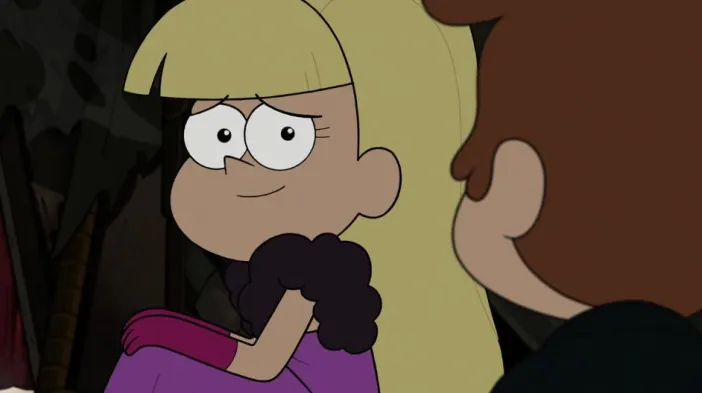
Re: What Bill might have done, like all things that happen off camera, that question has no true canon answer. But if I had to speculate, in my gut I think Bill would have incinerated Ford on the spot the moment he got the formula to shut down the barrier. I don’t see Bill as a romantic, sweet, or charitable character. He’s a psychopath who takes what he can get. He sees people as toys and when he gets bored of playing with them tosses them aside. I think at that point he was done playing.
Kaiser: Makes sense. There’s a decided inclination to read Bill as being sincerely impressed with Ford on some level because that’s the trope (i.e. Q in Star Trek), but it’s not quite in keeping with how things shook out, is it?
Hirsch: That’s not how I imagine Bill. I see him as a serial manipulator. While he’s “seducing” you with flattery his brain is somewhere else imagining playing ping-pong with a severed head. But people are free to imagine any headcanon they like! I’m genuinely excited by other people’s interpretation of the characters–but I never forget my own.
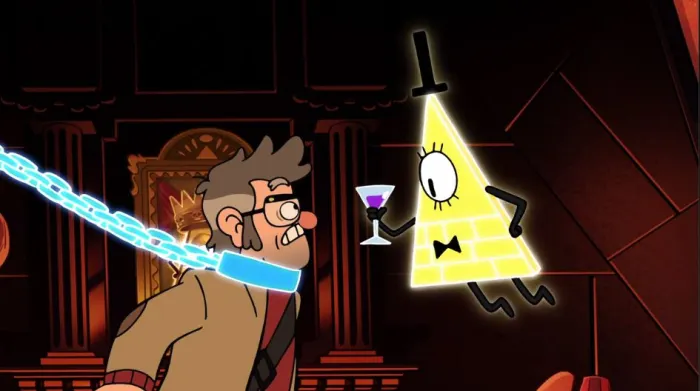
Kaiser: Is there a story behind that doodle you and Roiland (the creator of Rick & Morty) did of Rick and Stan? That’s a crossover that’s never coming, I’m sure, but I love the cross-show elements.
Hirsch: There’s been a lot of hay made out of the little winks about Gravity Falls in Rick & Morty, and vice versa, the truth is just that we’ve been friends since before we had TV shows, and enjoy messing with people. Although if we WERE planning something big we’d definitely deny it—so I guess you’ll never know!
Kaiser: You left one seriously huge plot thread open with Bill’s coded message in the finale and then the secret Axolotl page of the Choose Your Own Adventure book. Is that something you might come back to, or just a mystery for the fans to chew on?
Hirsch: In terms of Bill’s secret message … I like stories that complete their emotional arcs, but still leave some lingering threads to chew on. It gives the fans something to theorize on, and it gives me a window back into that world if I ever choose to return to it.
Kaiser: Do you have a medium you’d prefer? Or would it just depend at the time?
Hirsch: All depends on my schedule—and the creative urge. I’m involved in a number of projects right now, so it’s hard to say. Comics are definitely a possibility. And maybe a special one day. Honestly my dream would have been to do a Gravity Falls theatrical feature—Disney discussed it with me for a while, but ultimately (and probably rightfully) determined the show wasn’t big enough to warrant it. But if some lunatic wanted to give me 50 million dollars to make a Gravity Falls movie I’d probably do it!
Kaiser: Is there anything you can say about your other project (the one you publicly announced for Fox, or anything else), or is it too soon?
Hirsch: It’s too soon to say anything specific. I will say that Gravity Falls opened a huge number of doors and opportunities for me but I’m being careful not to announce anything until the time is right. (And most of the announcements and leaks you’ll see online about various things I’ve been involved with have been either inaccurate or premature) I can say that I have been working on a feature project that hasn’t leaked online (if you think you know what it is, you’re wrong!) that I’m very very excited about, but owing to the nature of the parties involved I can’t say anything. I’m counting down the days until I get to announce what it is.
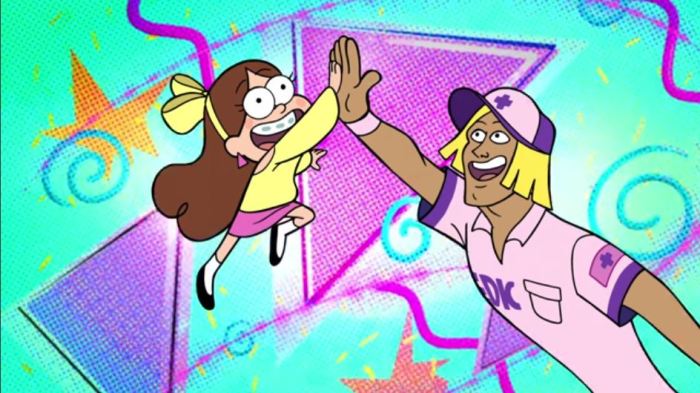
Kaiser: As a closer, you published a series of tweets not long ago about the stigma against being allowed to fail that animators face. Do you have any advice for them?
Hirsch: Haha! Oh, that. My latest tweetstorm was specifically about a trend I see in animated series development, where executives will “develop” a show to death and waste time, money, and goodwill trying to come up with a risk-proof TV pilot. But every creative act is inherently risky. The key is to create an environment where risk is encouraged, and failures have as small a cost as possible. I believe failure is the first step to success. The key is to fail as quickly as possible and try again. To treat failure not as a terrifying ending but rather as an opportunity to learn something.
Kaiser: Thanks so much for giving me your time!
Hirsch: Definitely! Thanks for writing about animation and caring enough about our cartoons to give them your thought and analysis. I think thoughtful critiques and commentary are invaluable for creators. We all benefit from honest feedback.
Want to share this on Tumblr? There’s a post for that!
Vrai is a queer author and pop culture blogger; they’re still just a little bit in shock. You can read more essays and find out about their fiction at Fashionable Tinfoil Accessories, listen to them podcasting on Soundcloud, support their work via Patreon or PayPal, or remind them of the existence of Tweets.
Want more stories like this? Become a subscriber and support the site!
—The Mary Sue has a strict comment policy that forbids, but is not limited to, personal insults toward anyone, hate speech, and trolling.—



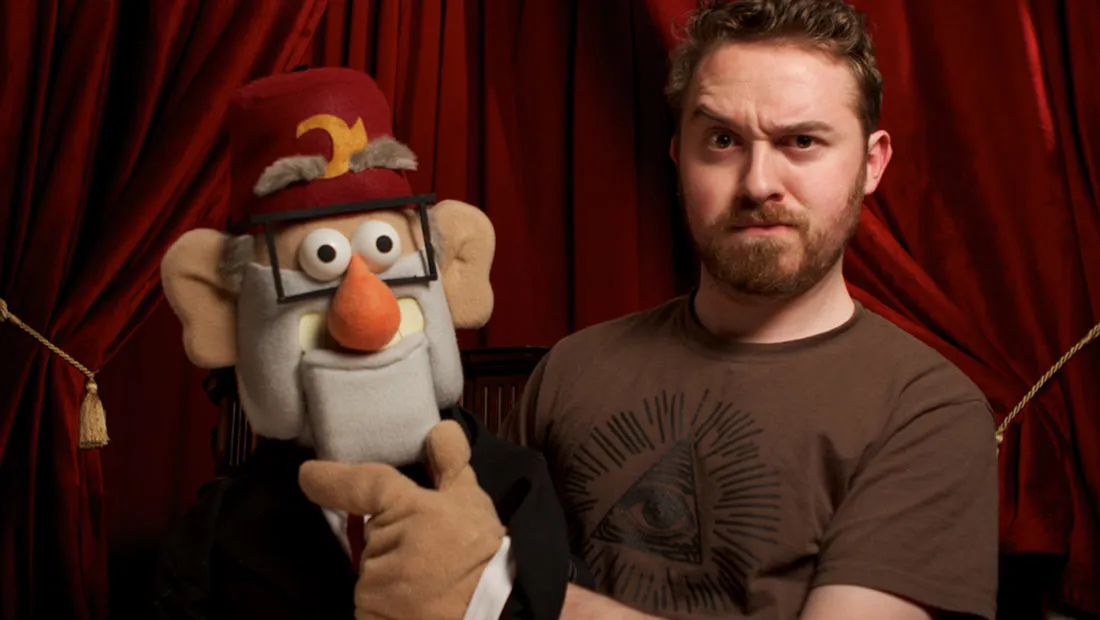





Published: Jul 14, 2017 03:24 pm